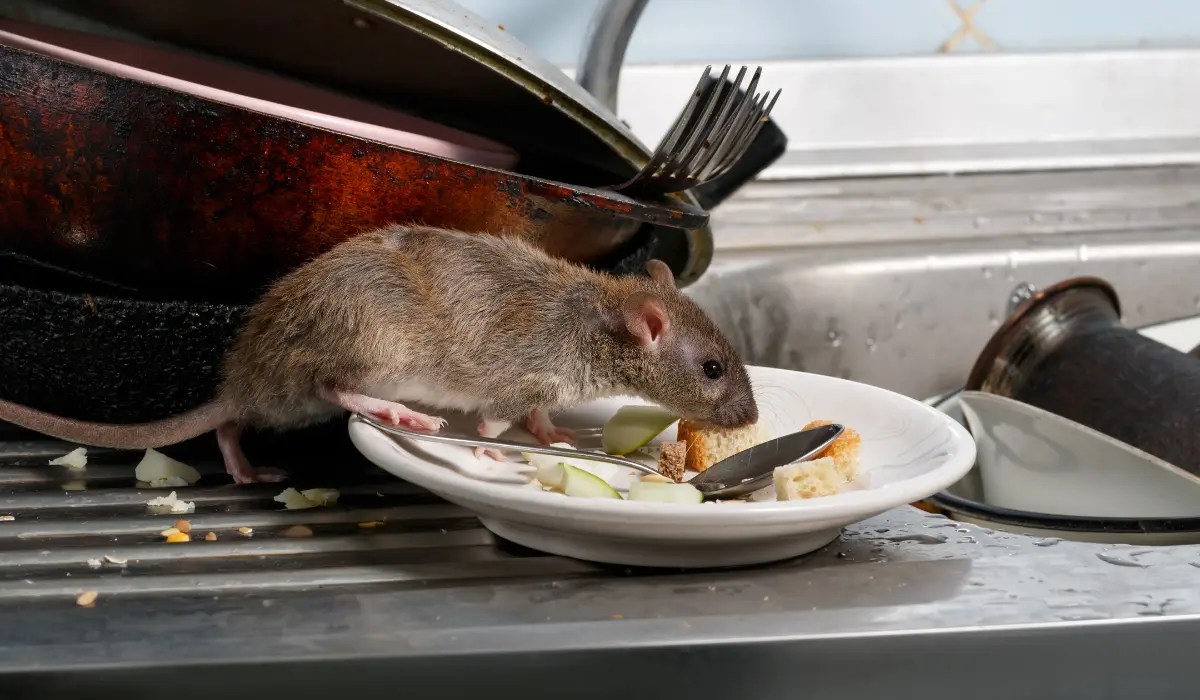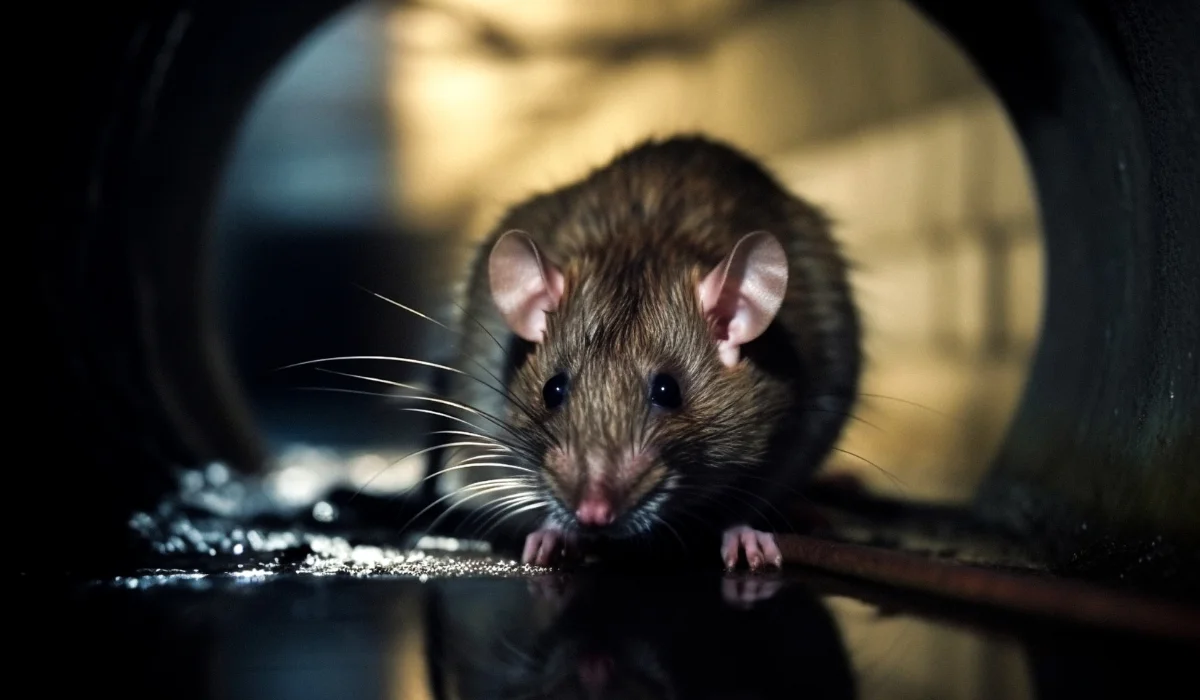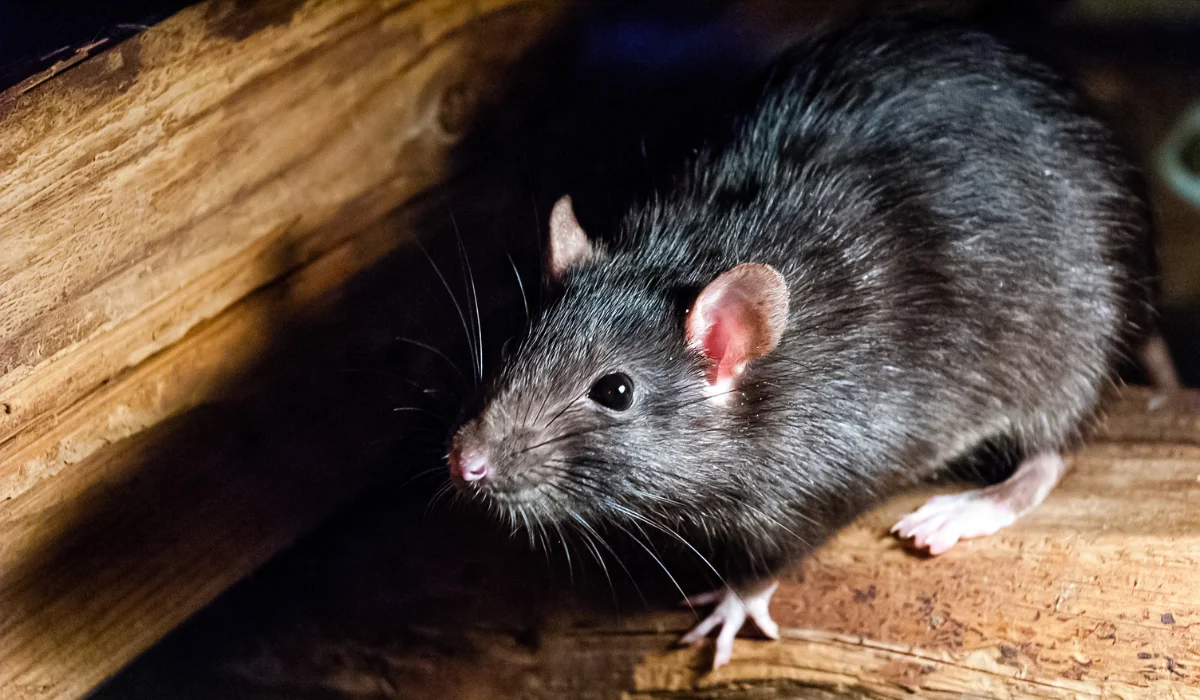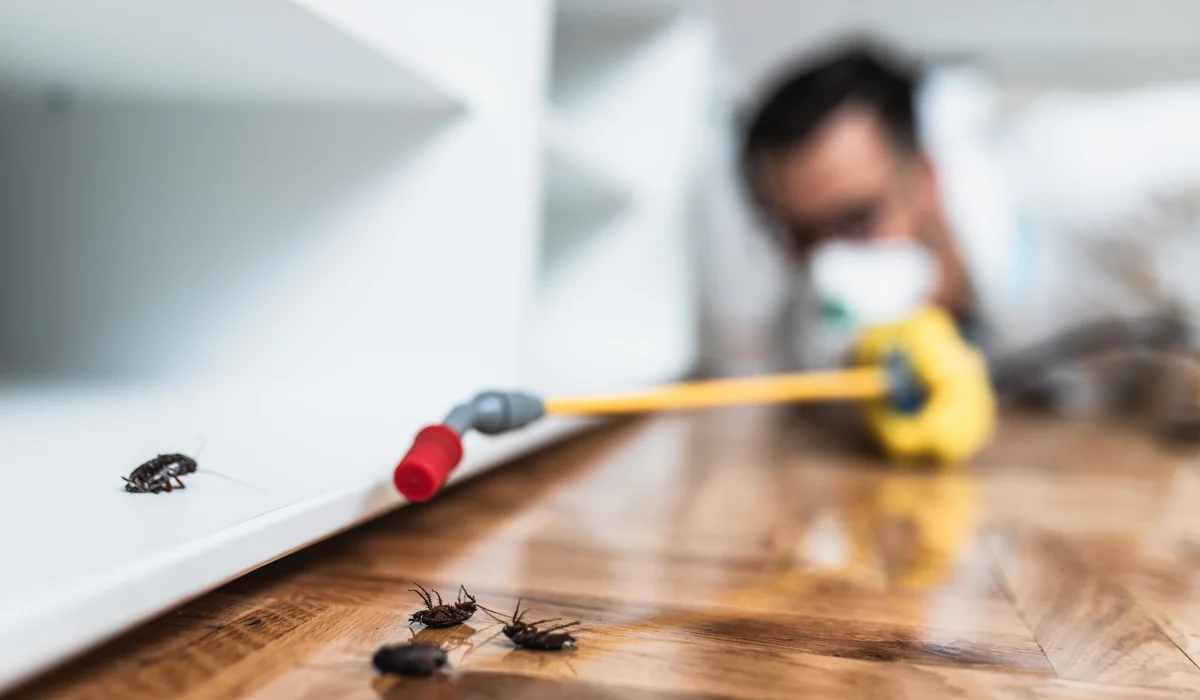Rats are a significant health issue in New Orleans, carrying diseases that can seriously harm humans. The city’s warm, wet environment and the damage from Hurricane Katrina make perfect conditions for rats to thrive.
These rats spread diseases directly through their waste and indirectly through parasites like fleas. From deadly hantavirus to common salmonellosis, the risks are significant.
Can residents of New Orleans control this problem and protect its rich culture and history? Read on to find out how you can fight back with the city.
Key Takeaways
- Urban rats in New Orleans are known carriers of dangerous diseases like Hantavirus, Rat-bite Fever, Leptospirosis, and Tularemia, posing serious public health risks.
- Rat infestations in Louisiana can significantly disrupt public health systems, affect food safety, cause psychological stress, and complicate waste management.
- Individual and community efforts, such as sealing homes, managing waste, and enhancing community coordination, are crucial in combating rat infestations in New Orleans.
- Professional services provide thorough inspections and customized treatments, essential for effectively controlling and eliminating rat infestations.
- At the first sign of rat infestation, prompt consultation with pest control experts is recommended to mitigate health risks and property damage.
COMMON DISEASES TRANSMITTED BY RATS IN NEW ORLEANS
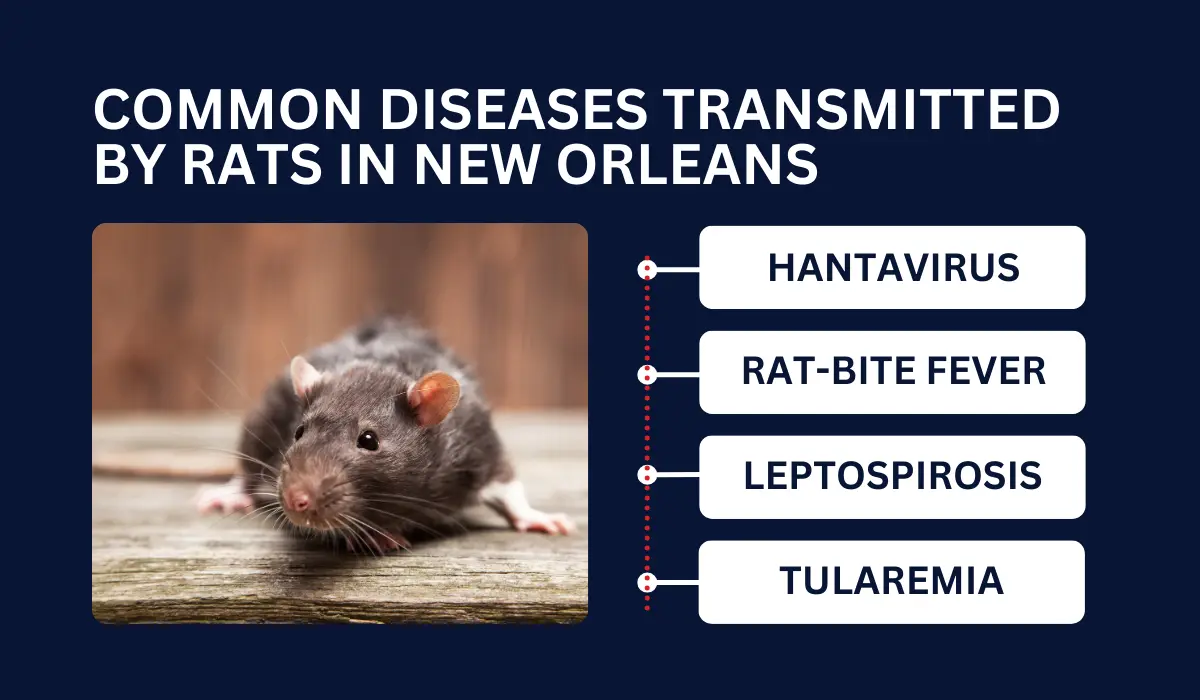
Urban rats in Louisiana, like Norway rats, are carriers for several infectious zoonotic diseases and pathogens, impacting epidemiology and public health.
Hantavirus
Hantavirus is triggered by a virus mainly carried by host species, such as cotton rats and rice rats.
You can contract this virus through rodent droppings, urine, saliva, or a bite. Here are some of the common symptoms and how they manifest:
| Symptoms | Characterization |
| Fever | Sudden, with chills |
| Muscle Aches | Especially in large muscles of the thighs, hips, back, and shoulders |
| Difficulty Breathing | Can develop into Hantavirus Pulmonary Syndrome (HPS) |
| Headaches | Can range from mild to severe |
| Dizziness | Associated with severe headaches |
Rat-Bite Fever
Rat-bite fever is an infectious disease caused by two different bacteria: Streptobacillus moniliformis and Spirillum minus. The former is more common in North America.
The following symptoms can arise after a bite, scratch, or contact with a dead rat:
- Fever
- Rash
- Vomiting
Seek medical care if:
- Symptoms persist longer than 48 hours
- The wound shows signs of infection
- You have been in contact with rodents and develop flu-like symptoms
Leptospirosis
Leptospirosis is a rodent-borne disease caused by the Leptospira bacteria. Research co-authored by James E. Childs shows that its risk is significantly associated with rat infestation.
You might encounter this bacterium through water contaminated by the urine of infected rats, such as Rattus rattus or roof rats. Its symptoms include:
| Symptoms | Immediate Actions |
| High Fever | Seek medical attention |
| Headache | Apply cold compresses and rest |
| Chills | Stay hydrated and rest |
| Muscle Aches | Rest and take prescribed pain relief if advised by a physician |
| Jaundice | Urgent medical evaluation as it may indicate liver involvement |
Tularemia
Tularemia is caused by Francisella tularensis. It can be transmitted through bites by infected animals like rats or through contact with contaminated water, soil, and food.
Symptoms for New Orleans residents:
- High fever
- Swollen lymph glands
- Muscle aches
When symptoms are left untreated, corresponding manifestations could escalate to:
- Pneumonia
- Severe inflammation in the lymphatic system
Other Diseases
Rats are vectors for diseases carried by ticks and fleas that may infect you. Notably, the study led by Rael found an increase in the number of rodents infected with rat lungworm caused by Angiostrongylus cantonensis.
Other vector-borne diseases include:
| Diseases | Causative Agent |
| Babesiosis | Babesia spp. |
| Tapeworms | Taenia solium and Taenia saginata |
| Lyme Disease | Borrelia burgdorferi |
KNOWING THE IMPACT OF RAT INFESTATIONS ON PUBLIC HEALTH
In Louisiana, rat infestations, such as food safety, community psychological stress, and waste management systems, can drastically affect public health.
Threatened Food Safety
A research co-authored by Michael J. Blum from the University of Tennessee indicates the prevalence of urban rat populations in New Orleans areas where flooding and abandonment were severe after Hurricane Katrina.
Hence, food safety is threatened by an increased likelihood of food source contamination through:
- Urine
- Feces
- Saliva
Waste Management Challenges
In New Orleans, species co-occurrence with a high population of rats can complicate waste management. Hence, proper disposal is critical to control rodent populations.
Some strategies you can employ or take part of include:
| Strategies | Function |
| Enhanced Rodent-Trapping Containers | Limits rats’ access to garbage, reducing feeding. |
| Community Clean-up Drives and Events | Decreases litter, minimizing rat hiding spots. |
PREVENTING AND CONTROLLING THE SPREAD OF RAT INFESTATIONS
Effective ways to get rid of rats would require a mix of individual diligence and collective action. Thus, it’s essential for residents to adopt preventive practices and for agencies to synchronize efforts across New Orleans.
Personal Measures
Taking personal measures is crucial in curbing rat populations. Small steps can have a significant impact on preventing infestations. According to the Centers for Disease Control and Prevention (CDC), here’s what you can do:
- Seal up entry points: Closing gaps and holes in your home impedes rats from entering.
- Manage waste properly: Secure trash in rodent-proof bins to avoid attracting pests.
- Clear clutter: An organized space leaves fewer spots for rats to hide.
- Set traps and baits: Effective rat trapping reduces the existing rodent population.
- Conduct regular inspections: Check your premises often to spot signs of rats early.
PROFESSIONAL PEST CONTROL SERVICES
While DIY pest control may help slow down the process of a rat infestation, you should turn to professional pest control services to ensure a safe resolution.
At LaJaunie’s Pest Control, we provide a comprehensive rodent control that tackles rats and house mice. Here’s how our professionals tackle rodent control:
- Assessment: Our state-certified inspector thoroughly examines the property to identify rat entry points and areas needing repair.
- Documentation: During the inspection, our team photographs problem areas and provides a detailed plan to resolve the issues.
- Agreement: You review our proposed solutions. Once you agree, a date for the pest control work is set.
- Execution: Our wildlife team arrives equipped with the requisite tools and rechecks the account for service details.
- Attic Check: Our team inspects the attic for signs of rodents, such as running trails, chewing damage, nesting materials, and droppings. They then apply treatments like Maki Paks or dust to deter rats.
- Indoor Trapping: Baited glue traps are strategically placed indoors to capture any rodents inside the home.
- Bait Stations: For regular control measures, rodent bait stations are placed around the home based on evidence of rodent activity.
- Burrow Addressing: For rodents that burrow, advanced solutions like the IGI CO2 burrow eliminator are available, though additional fees may apply.
IS IT TIME TO CALL THE RAT EXPERTS?
Given the risks of rodent-borne diseases, you should consult pest control experts as soon as you identify telltale signs of rat infestations.
Whether you’re in Orleans Parish or the French Quarter, seeking expert help should be easy. For immediate intervention for a severe infestation, let Lajaunie’s rat control specialists tailor a solution that’s right for your home.
For more information about the areas we service, visit our location page.
 By: LaJaunie's Pest Control
By: LaJaunie's Pest Control 